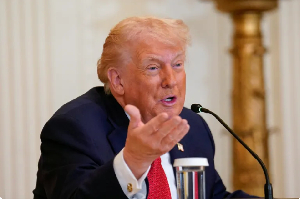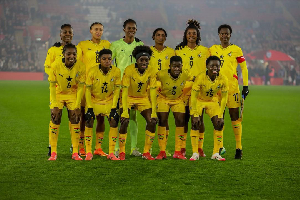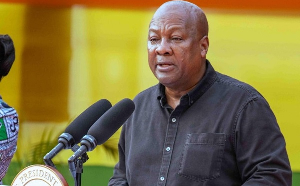Part I
Before the altercation of the Asantehene, politicians, and some journalists in the country have deliberately insisted that it was politically incorrect to discuss tribalism in Ghana. Today, Ghana cannot afford to wallow in that misconceived perception that tribalism need not be openly spoken about. Sudan, Rwanda, Burundi, Sierra Leone, Liberia, Somalia, and Ivory Coast are some of the countries in Africa that have been torn apart by tribalism. I am not adducing that ethnicity is the cause of such conflicts. However, ethnicity has been a resource in the hands of frivolous ‘political entrepreneurs’ who because of corruption, mismanagement, and greed for power have manipulated ethnicity and use it to achieve their personal agenda. Recent developments suggest that, Ghana is gradually becoming a trove for such frivolous ‘political entrepreneurs’ and if care is not taken, the nation shall be plunged into violence and conflict. Indeed the Asantehene’s tribal statement is only symptomatic of deep-rooted attitudes and behaviours of some shortsighted Asantes and similar minded ethnic groups in the country. These attitudes may be traced from the days of Ashanti Confederacy, National Liberation Movement (NLM), to the present day politics. The tribal statement of the Asantehene, Mr. Kwame Arhin (a Kumasi based legal practitioner), Mr. Alex Asabere (a London based business executive), and other Ashanti Chiefs and some groups have forced some citizens, to argue that tribalism is the ethos of the Ashantis.The concept of Tribe was derogatorily developed in the 19th century by racist western scholars, and journalists to designate alien ‘non-white’ people as inferior or less civilized, and as having not yet evolved from a primal state. But for the purpose of this article, I will with much reluctance use tribalism and ethnocentrism interchangeably to convey my thoughts and opinions. Ethnicity is a noun from a Greek word ‘ethnikos’ meaning ‘heathen’, implicitly meaning the origin of a person. Ethnocentricism may refer to any action or attitude, conscious or unconscious, which subordinates an individual or a group based on origin (language, ethnic origin, culture etc.). This action can be enacted individually or institutionally. This attitude or behaviour is based on ones extreme viewpoint or loyalty to a tribe/ethnic or social group, ignorance, excessive pride in one’s ethnicity, and/or intent to suppress and dominate.
As our society become ever more multi-ethnic and members of perceived minority groups reach positions of power and influence, tribalism is becoming the predominant form of subtle oppression of “ethnic minority” in Ghana and Africa. It is even more worrisome for people to openly espouse ethnocentric philosophy in this 21st century. It is evidently clear that you can be ethnocentric, regardless of ones religion, intelligence, social status, and benevolence. The future of Ghana as a unified State is critically dependent on how the nation respond to this cancerous phenomenon. Broadly, I will argue that Ghana is confronted with two main types of tribalism; individual/group tribalism/ethnocentric and institutional tribalism/ethnocentric. I will attempt to deal with the types of tribalism and recommend actions needed to isolate this cancer.
Individual/Group tribalism
We cannot deny the fact that, tribal and ethnic issues are so fundamental in Ghanaian society that they seem almost an integral component. It is becoming a common phenomenon for some myopic thinking Ghanaians to behave as if ethnic differences produce inherent superiority in people of some specific ethnic group. In fact, such individuals respond to other Ghanaians differently merely because of ethnicity. Individual tribalism occurs in our day-to-day activities at informal level. This tendency is exhibited in daily conversations, jokes, and how we perfunctorily relate to one another. At this level, the tribal behaviour may be conscious or unconscious. The idea however, is to demean or lower one ethnic group in other to raise the profile of the one the ethnocentric belong. An ethnocentric tendency at this level is implicit in behaviour and can be identified by certain behavioral signs.Ethnic stereotypes
This often is done in very subtle ways. For example, the belief that some ethnic groups are more adept in particular jobs or tasks, and the belief in differences in intelligence among ethnic groups; In Ghana for instance, the notion that the only job Ewes excel in is carpentry, people from the Northern extraction as watchmen, Fantes are only as good as comedians, Kwahus as people who undertake sikadro, are some of the very dangerous ethnic stereotypes that persist in this country. The stereotype that all Ewes are ‘jujumen’ and therefore wicked people, and krobo women as prostitutes are some of the stereotypes that have on many occasions prevented families from marrying into some of these ethnic groups, and also inhibit the development of meaningful relationships necessary for both community and national development.Advocating for segregation
This advocacy represents a belief that different ethnic groups should live apart, have absolute control over certain national resources, and be exposed to special benefits. This advocacy began during pre-independent Ghana. The Ashanti Confederacy at pre-independence unsuccessfully agitated for a Federal State so as to appropriate the perceived wealth of the Ashantis. The Asantehene’s Educational Endowment Fund may be argued to be a laudable idea. However, it has been alleged that anyone who desire to access the fund undertake an examination, which is based on the history, and culture of the Ashantis. This is indoctrination, a subtle imperialism, and implicit form of advocating ethnic superiority.Extreme pride in one's ethnic group and Obsequious
Patriotism is good but extreme pride in one’s ethnic group has been proven to be the basis of all fascist regimes. The subsequent sentiments expressed, and death threats issued after Asantehenes’ admonishing speech, by one of the Ashanti Chiefs claiming to be the war chief of the Ashantis, Kwame Arhin, Alex Asabere (a London based business executive and political activist), and some Ashanti groups, coupled with the deafening silence of the NPP government should be a cause of worry to all well-meaning Ghanaians. As far as the cocaine saga is concerned, no ethnic group, political group, or social group have attacked the dignity of the Ashantis nor indict them in any way. The demand by some well meaning Ghanaians for the Asantehene to appear before the Georgina Wood Committee was rather an opportunity for the Asantehene as a person who is subject to the Constitution of Ghana to clear his name and to protect the dignity of Asanteman. He rather employed an ethnocentric tactics to divert attention from the real issues at stake.The ranting of these so-called Ashanti loyalists is a mark of a fascist and imperialist agenda. It is obvious that these people are oblivious to the fact that the chieftaincy institution is gradually becoming incongruous to our democratic dispensation. Constitutionally Chieftaincy administration is subject to Chapter Twenty-Two of the Constitution. According to Kwame Arhin, ‘Ashanti better qualifies as a nation’, and that Asantehene is not an ordinary chief and for that matter is not subject to the Regional Minister who is a representative of the Presidency, the highest administrative executive of Ghana, is not only obfuscation but also obsequious.
The silence of the President and the Minister for Chieftaincy Affairs on these developments raises questions. Article 6 clause (a) states that, ‘the state shall take appropriate measures to foster a spirit of loyalty to Ghana that overrides sectional, ethnic and other loyalties’. These ethnic diatribes pose serious threat to the stability of this country and it is the responsibility of the government of the day to act appropriately to forestall any eventuality. It is a known fact that, most African countries suffered ethnic conflicts as a result of their government’s subtle support for a particular ethnic group or government’s insensitivity to issues bothering on ethnicity. This was recognized by U.S. Illinois Senator, Barack Obama who summed up the situation in Africa as saying, “the enduring tradition of ethnic-based politics built around tribal factions has set back many African countries’ development.”
Constant references to the person’s ethnicity.
A mere mention of someone's ethnic group on a first encounter could be benign. But constant reference to the person’s ethnic group after a long period of knowing that person no matter how innocent the references may appear, they establish an unmistakable tribal pattern. Ayigbefo, Pepeni, Comedians are some of the tribal patterns that mark such people as ethnocentric.Belittling other ethnic groups and Indifference to the feelings of other ethnic groups Constant criticism, and ridicule of the opinions of other ethnic groups, which is often done sarcastically without explicitly making mention of the ethnicity of the persons. It is also typical to make fun of members of the “inferior” ethnic group without any consideration to their emotional feelings.
Excessive Hate for a particular ethnic group Ethnocentric adopts an exaggerated reaction to any perceived misconduct from a person of the other ethnic group. In this situation the punishment is out of all proportion to the original wrong whether real or perceived and completely ignores the provocation that could have led to the ‘misconduct.’
Non-recognition of the abilities and achievements of other ethnic groups This attitude is so endemic in our political history. Some ethnic groups in this country have consistently denied the intelligence, cultural level, social status or other qualities of other ethnic groups even in the face of overwhelming evidence. In 2001, one of the regions in the northern sector of the country was said to have no quality and intelligent persons in the region to hold political office under the NPP administration. History has been distorted to exclude the significant contributions of some prominent people from minor ethnic groups to the development of Ghana. These ethnocentrics always attempt to “objectively” show proof, usually in the form of insignificant details that such persons do not deserve a place in history. When the NLC overthrew Nkrumah, it dismantled just about everything associated with him, ostensibly to wipe off all memory about him because he was from a minority ethnic group, and secondly to obliterate the significant achievements of a Black African.
The politicking of NPP about the “non achievement” of Rawlings in the past 19 years and utterances such as Akonta besi fom, ‘we are taking over our country’ as election slogans in 1992 and 1996 elections goes beyond political campaign. The excessive veneration of Danquah, Afrifa, Busia, Acheampong, President Kufour, Asantehene as King of Ghana and therefore untouchable, and refusing to openly acknowledge and recognise Nkrumah, Limann, and Rawlings in the history of Ghana does not only demonstrate political immaturity but also suggest high level tribalism. As one George Kweifio-Okai put it in his article “a mental attitude that sees no good in an enemy is self-destructive, worse it creates martyr of opponents when history is written and critics are harshly judged.”
Condescending attitude or behaviour Ethnocentric shows condescending attitudes towards members of other ethnic groups. They exhibit this by attacking members of an ethnic group, which ‘cause them most offence’. They even employ members of ethnic group they perceive as enemies and use them to attack members of that ethnic group. They show magnanimity by treating the people they have employed as members of “superior” ethnic group. These ‘employees’ openly condemn the culture of their ethnic group as backward and shower praises on the members of the “superior” ethnic group.
Furthermore, ethnocentric have no insight into their own prejudice. They believe that their prejudice is based upon objective grounds that cannot be compromised. By this strong fixation, an ethnocentric is capable of violence and other forms of crime towards members of what he views as the “inferior” ethnic group. He could easily support the use of force to dogmatically maintain their “superior” belief. The death threats by the so called Ashanti Youth, and the War Chief on some journalists, the statement by Alex Asabere “out of concern for the peace of Ghana and the stability we need for development, Asantes have CONDESCENDED to swallow the insults and abuse against them in the past” he further admonished the Ashantis by saying that, “we should all remember that if we sit unconcerned to allow these MISCREANTS to attack the very embodiment of our soul, then Asantes shall cease to be a force to reckon with in Ghana. And that is what our ENEMIES seek to do” (Daily Graphic, Tuesday, October 10, 2006, page 17), attest to this condescending attitude. Kwame Arhin’s crusade against what he believes as anti–Ashanti feelings by a section of the populace, that ‘the King of Asante is not comparable to any other chief in the land…. and that Ashanti constitute a NATION and that the attainment of REPUBLICAN status (of Ghana) does not take that away’ (The Chronicle, Tuesday, October 10 2006, page 13), coupled with the infamous statement of Asantehene that Ashanti exist before Ghana was born, is prejudicial and shows contempt to other ethnic groups in the country.
Imposition of Language and Culture
This has become a common phenomenon in our everyday life. Some languages are regarded as more ‘civilized’ than the other languages in Ghana. Akan speaking people in the offices accepts speaking Twi for example in any formal environment, with ease. Let Ewe, Dagomba, or any minority language be spoken and you will discover to your horror that the Twi speakers will resort to name calling, such as number 9, Pepeni, meter band, etc. This is an exhibition of a deep tribal arrogance and fascist tendencies. It has been proven that ethnocentrics will typically try most to denigrate members of other ethnic groups that act, as a rebuttal to their model of what members of the other ethnic group should be. Most conspicuous this year was the advert on the recent opening of voters register in Twi and English on our national Television. This was not only tantamount to the neglect of the electoral rights and conscious assault on the fundamental rights of the citizens, but can also be argued to have an ethnocentric tendency.I must however, caution that, any language, which is not native to the speaker, dwarfs the person’s ability to think and be creative. Twi language has its own history and its historical developments, which are distinct from the Ewe, Dagomba, Mamprusi, and Ga languages. What we need to identify as a nation, is how best to harmonise the beauty in diversity for a well-defined and focused development. Changing someone's language and giving him/her a foreign language, is an imperialist and colonialist agenda and strategy intended to change the person's identity, originality and inherent creativity. The problem of Ghana and for that matter Africa is not about ethnicity or language but the lack of recognising growth and development in diversity.
In the UK for example, there are four major ethnic groupings that form the United Kingdom; the English, the Welsh, the Irish, and the Scottish. All of these ethnic groups still maintain their identities, language and culture in modern UK. In the 17th and 18th centuries the tribes of Celts occupied France to create the Frankish Kingdom, as the only world. Germanic tribes from the east, including Burgundians, Franks, and Visigoths, crossed the Rhine River and entered Gaul. In this 21st century, Belgium has two languages and poses no racial, ethnic, and linguistic problems for the country. Spain has three languages, Castilian Spanish, Catalan language, and Basque language. Switzerland has four official languages, English, French (19%), Italian (8%), and German (spoken as first language by 64%). In a referendum, the Swiss declared Romansh (spoken by 40,000) as the fifth official language. These languages have not prevented Switzerland from uniting themselves under the control and ruling of a government of their choice.
Partiality
Ethnocentric expects members of his ethnic group to be similarly ethnocentric. This often results in expectations of preferential treatment. This is extremely common and affects practically all the ethnic opinions and decision-making. Its effects extend beyond the obvious areas like employment, education, security, housing, and national appointments. The recent public reaction to recent ethnocentric developments affirms the effects of tribalism in our society. According to the Christian Council of Ghana, “the tendency (tribalism) had permeated the educational system, with instances where some teachers and lecturers allegedly gave undeserved favours, sometimes academic, to some students simply because they belonged to the same tribe or ethnic group” (Daily Graphic, Thursday, October 26, 2006, page 3). The recent scandals of examination malpractices at the University of Ghana, and the alleged mysterious passing of Law examinations papers at the Ghana Law School by an Editor in Chief of a popular newspaper, are dangerous effects of tribalism.According to Rev. Professor Emmanuel Addo-Obeng, “Indeed, (this) behaviour signals a rather turbulent future for the country and everything ought to be done to address the issue” ((Daily Graphic, Thursday, October 26, 2006, page 3). Of course, this prologue must be of concern to any responsible government.















